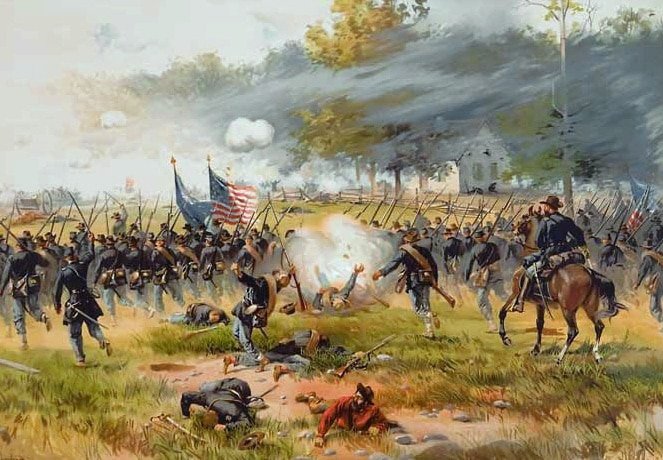
The Confederates handed the Union a key victory on the “Cotton Front” before a shot was even fired in the American civil war. However, without the agility of the Greek cotton merchants, the alternative supplies may not have been enough, or established in time.
By Alexander Billinis
The “what ifs” of history have always been of interest to me, as a historian. In many cases profound events turn on chances both large and small, or in other cases, the game of history is well fixed, and in advance.
Sometimes, too, as a historian, one stumbles upon a “what if” investigative path, almost by accident.
I had always been interested in the Greek Orthodox Community of New Orleans, as it was the first Greek Church community in the United States. I understood it to be in many ways an outpost of a larger Greek merchant and expatriate network that extended throughout Europe and the Mediterranean.
When we lived in Europe, we visited the remnants of many of these communities, in Vienna, Venice, Trieste, Budapest, and elsewhere. I was well aware of this dynamic, articulate merchant/shipping diaspora, and its role in Greek independence and the growth of the Greek merchant fleet.
However, it was only after I began my master’s degree in history at Clemson University, in conjunction with teaching there, that I started to put the various threads together. As a Hydriot and the son and grandson of sailors, I quickly decided to focus on the Greek Merchant Marine for my thesis. The Greek merchant fleet specialized in the bulk carrying trade, and cotton was a key commodity in the 1800s.
At our local Greek Orthodox Church in Greenville, South Carolina I met a woman from New Orleans who introduced me to the New Orleans parish’s archives committee, which contained a treasure trove of information about the early Greek community there, where cotton merchants, usually agents of Greek houses located in Europe, settled in the boom times of the Antebellum South.
At the same time, I took a class on Middle Eastern History, where the professor suggested that I look at the Greek merchant community of Egypt in the nineteenth and twentieth centuries.
These various elements fused together to tell a story. Among the key Greek activities in Egypt, where Greeks made up the largest European population, was the cotton trade and production. Greeks already controlled one third of Egyptian cotton production by 1839, but Greek houses, part of family-based networks extending from Alexandria to Chios, to Manchester, New Orleans, and Calcutta, were well informed of the events in the American South, by far the most important supplier of the “white gold” to British and French manufacturers.
With dangerous hubris, Southern politicos claimed that “Cotton is King” and that either a self-imposed or Union Navy instituted blockade would force the British and French to intervene by breaking the Union blockade, recognize Southern independence, and restart the flow of cotton to European mills.
Greek cotton merchants
These Greek merchants navigated the shoals of politics with the same acumen as those of economics. As sectional strife mounted, many Greek cotton merchants left New Orleans, and often took up residency in Alexandria directly. They brought their market knowledge, and the latest cotton gins. They were aware that the market for Egyptian cotton would shortly explode—and it did!
The Greek merchant houses rapidly expanded and financed cotton production in Egypt to meet the demand from Northern European mills. Beyond Egypt, in the still-unredeemed but Greek populated Ottoman provinces such as Thessaly, Macedonia, and the Smyrna hinterland, cotton production rapidly expanded as well, and the Greek merchants sent this produce on to Northern Europe as well.
Egyptian production increased fourfold in the years of the American Civil War. Britain and France did not recognize the Confederacy and the South ultimately lost the war against the more populous, more industrialized, wealthier, and more creditworthy North.
Did these merchant houses change the course the American civil war?
Such a question is indeed difficult to answer. The Confederate States had many weaknesses vis a vis the North, along with the moral scourge of slavery which offended many British (although they were voracious consumers of Southern slave plantation cotton and actively financed the whole system). Britain also feared the rising commercial and naval power of the United States and a divided country with one portion heavily dependent on Britain was indeed attractive.
However, the attempt to blackmail Britain with cotton failed. Having long threatened the world economy with the consequences of Southern cotton famine, cotton merchants, many of them British subjects yet all too often members of savvy Greek houses, sought alternate supplies.
Prices increased and industry suffered yet the mills still worked. While the British and French did not love the North, they appreciated both its military and commercial power, as well as its creditworthiness. The North ultimately won on all fronts—military, diplomatic, and financial. To a degree, the Confederates handed the Union a key victory on the “Cotton Front” before a shot was even fired. However, without the agility of the Greek cotton merchants, the alternative supplies may not have been enough, or established in time.
The Southern Cotton Strategy failed, and the quiet fixers in this economic and diplomatic game were members of a discreet and tight-knit merchant class sailing under the headlines of history. Often these are the people who create history’s headlines.
Alexander Billinis is a Greek-American writer, author, lawyer, and university lecturer. He is the author of two books:
 RSS Feed
RSS Feed















 August 27th, 2021
August 27th, 2021  Awake Goy
Awake Goy 
 Posted in
Posted in  Tags:
Tags: 













